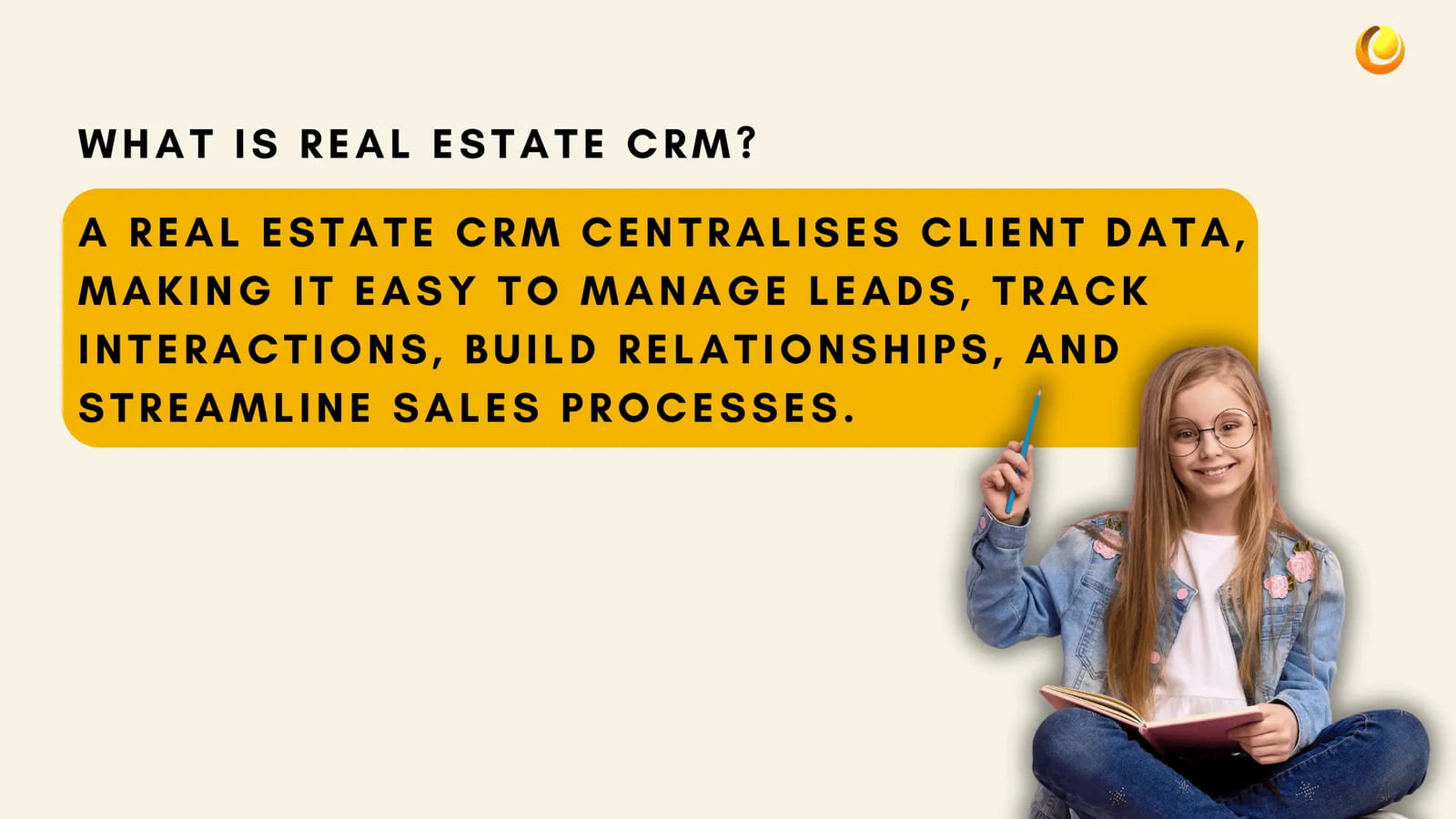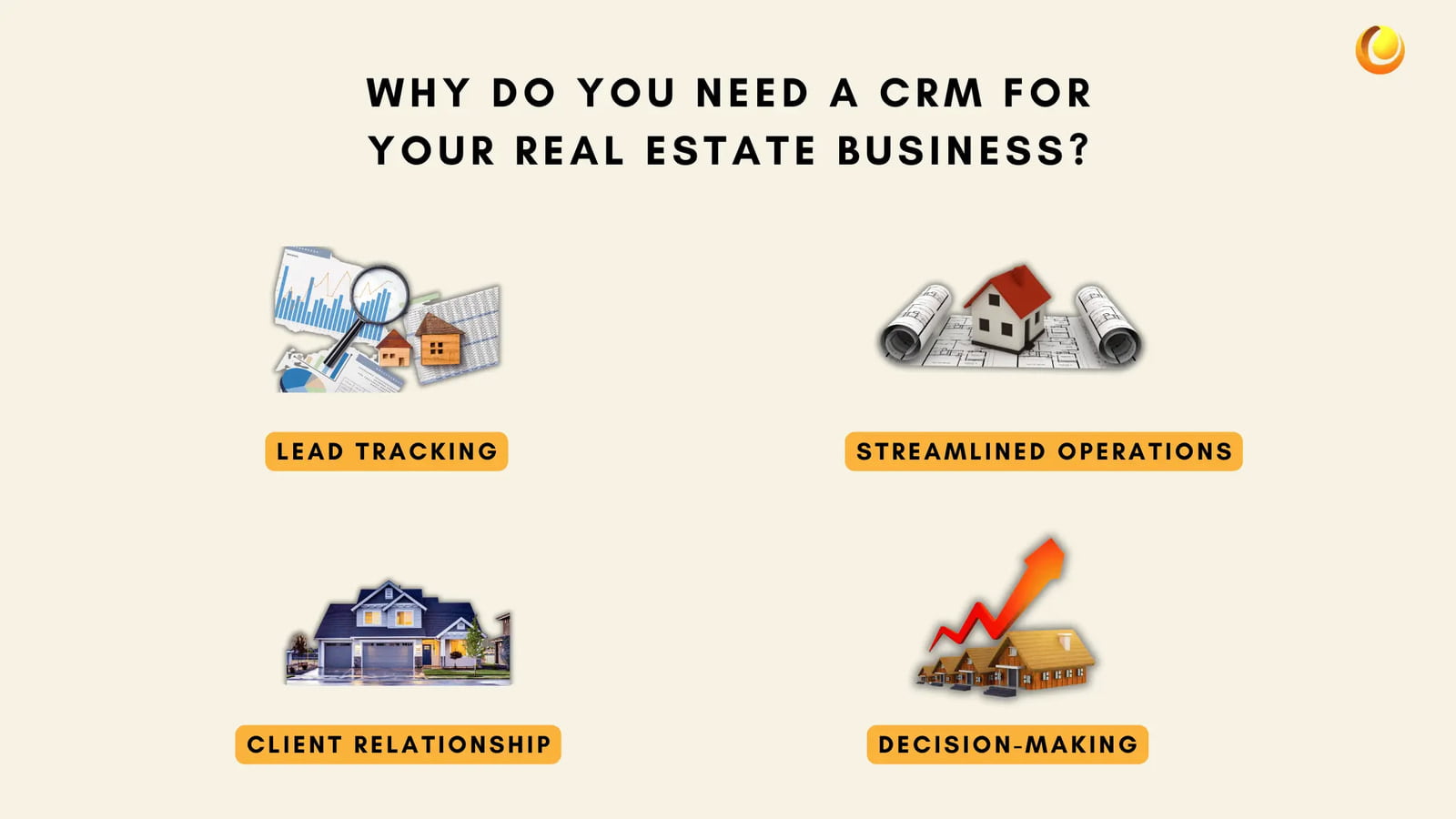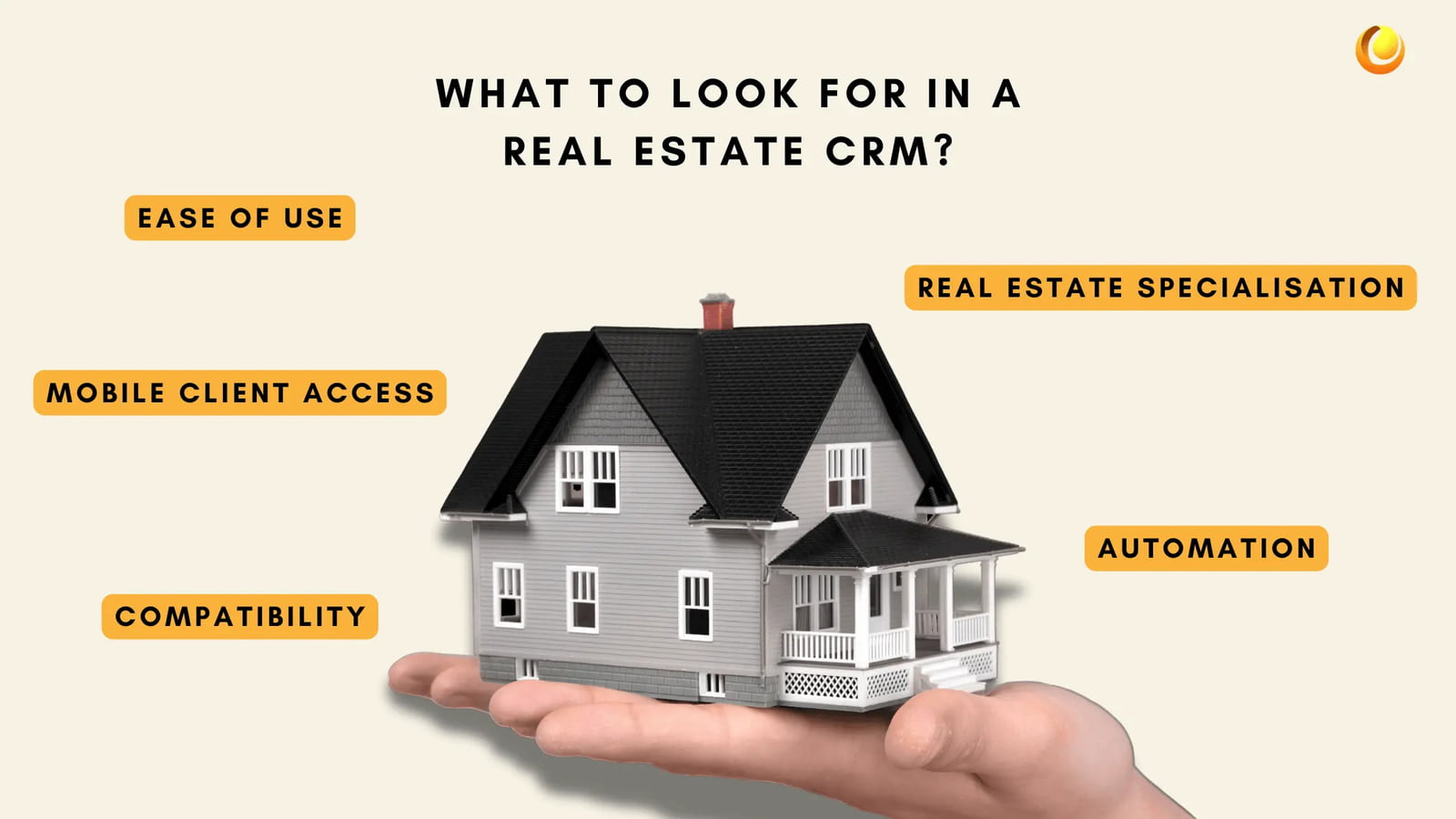
What is Real Estate CRM?
Real estate CRM is a software application designed specifically for the real estate industry to manage the leads and customer interactions of every sales process and after-sales services efficiently. Centralising all client information makes it much easier to keep track of interactions, build relationships, and systematise sales efforts. By serving as a central repository for data, a real estate CRM can mean each prospect is taken care of and every client gets quality service, reducing the likelihood of lost opportunities. For real estate businesses, it's the accompaniment to providing value.

Dealing with multiple leads, tracking follow-ups and keeping clients' attention can be simply overwhelming in the real estate world. Those routines will all get a lot easier if you integrate a CRM in your work: emails that thank or remind the client about meetings? It kind of helps things out to know what your customer prefers.
Another plus is when an agent is sure of where each new lead came from and the timeliness of responses is not forgotten. A real estate CRM offers several crucial functionalities which can help you and your brokers raise overall office productivity, overhaul the way they do business for more results per dollar generated, and with luck even help you sell something today
It empowers businesses to convert leads into clients. Enterprising agents are persistent in their approach; they understand that a soft but compelling touch can often win the day.
So how crucial is this real estate CRM stuff? Well, it acts as a linin between good management and bad: With it, you unify all data and file communication within your firm onto one platform so everyone else has access to what's going on in heaven.
Why Do You Need a CRM for Your Real Estate Business?
Making every client feel important and staying organised is essential for success. A real estate CRM can change the way you operate, and in the process provide benefits for various key components of your business:

Lead Tracking: Through a CRM you can track every potential buyer or seller, don't let any opportunity slip through your fingers. It prompts you to follow up on potential transactions that are at risk of not coming together. It stores detailed information about the needs and preferences of each lead, allowing your messages to be tailored accordingly. This level of organisation not only helps you convert leads into clients but also streamlines the entire selling process, making it more efficient and time-saving.
Client Relationship: In real estate, where personalised service can make all the difference, creating strong bonds with clients is crucial. To Recall somebody's specific preferences, say the fine details about your clients that a CRM can take care of our favourite types of homes, and house computers. important dates, such as when they emigrated from their native lands. By using this information in your customer interactions you make clients feel special and appreciated, which increases the likelihood of repeat business as well as provides you with a steady stream of new customers through word-of-mouth communication satisfied among themselves. This also has potential long-term benefits for building up future referral networks to other real estate businesses etcetera.
Streamlined Operations: Managing the routine of real estate daily is boring and time-consuming. A CRM takes many of these dreary tasks out of your hands by automating them itself. For instance: Sending new listings out by email is handled automatically, Appointment Remainders are sent via a CRM system, and Even follow-up emails are automated to go out after you leave appointments It thus leaves you with more time to focus on closing deals, and keeps pushing that "client relationship" aspect all front and centre, which boosts overall productivity too.
Decision-Making: A CRM can provide full-scope data for your sales, marketing campaigns, and lead sources. By analysing this information it is possible to find out which tactics work and what needs changing in return. You then reapply your methods accordingly still getting better results than before. The ability to make decisions based on empirical evidence like this is essential for anyone involved in real estate if they want to stay competitive and grow their business.
What to Look for in a Real Estate CRM
Selecting the best CRM for your real estate practice is critical, and certain features must be evaluated before making any choice. Here's what you need to seek out when considering options:

Ease of Use: Users should find a CRM simple to understand and practical. There's no purpose in trying to save effort for oneself by using complex software; the main thing is to save time and do work efficiently. Equally important, look for a CRM system offering an interface that is easy to comprehend at first glance and which allows prompt access and updating of one's information without considerable learning curve involved.
Real Estate Special: The CRM should be developed around real estate, and incorporate features that match your business's specifics, such as property management, lead tracking and customer communications tools. Niche CRM software is likely to lack the functionality needed for the effective management of a real estate business.
Mobile Client Access: Realtors are active with clients, showing houses and attending open houses, it's obvious that you need a CRM offering robust mobile access through an app so that you can run your business from anywhere. This enables your location to help productivity by making sure all necessary and kind contacts never were missed only because you were away.
- Automatic: Automation is an integral part of any CRM, letting you automatically recount the number of follow-ups that can be foreseen, say in a month or year later letters and email marketing projects. This saves time and ensures that no necessary task gets lost in the shuffle, which might inadvertently disincentivise consistent engagement with leads or current clients.
- Compatibility: Your CRM must be able to interact smoothly with the other software and services that you use such as your Email Client, Calendar Tools, your Social Media accounts and any Marketing Automation System you might employ. This integration of processes means generally a cleaner way to deal with your workflow issues as far as cloud business infrastructure goes. Synchronous data across various platforms helps to reduce errors and ensures that equal levels of service can be maintained from platform to platform.
Top Real Estate CRMs to Boost Your Business in 2024
So now, let's take a look at some of the greatest real estate CRMs that will allow you to streamline your business operations, enhance ties with customers, and increase sales:

Zoho CRM
Zoho CRM is a versatile and robust tool that meets the varied needs of real estate businesses -- whether large or small. Famed for its flexibility, Zoho CRM lets users customise the dashboards they view, workflows they use and sales pipelines it discusses.
Therefore suited to businesses which need an individual touch, it offers a full set of features including lead management, email marketing and advanced analytics. All these facilities assist your team in tracking and nurturing potential customers that come to market.
One of the outstanding features of Zoho CRM is its AI-powered genius, Zia. These intuitively bring insights, predictions, and suggestions on how to prioritise tasks and leads. This will significantly help raise your efficiency in sales and customer service. Besides, Zoho CRM plays nicely with a large set of third-party applications, including many from the Zoho suite of business tools.
This makes it easier to establish a comprehensive technology ecosystem. Zoho CRM provides a solid foundation and various price options for real estate businesses wanting to organise their work and grow. It offers every step from just getting started up to keys in the door.
HubSpot CRM
For those real estate businesses who just need a simple and user-friendly platform that packs a punch, HubSpot CRM fits the bill. Providing the means to grow a business better, HubSpot CRM has various tools for managing contacts, dealing with deals and automating work at its clean user interface which allows companies of any size the opportunity to manage more effectively. It is a detailed customer information management tool, enabling the agent to organise client details and property information in one location. This optimises the relations of clients and their quality.
One thing that sets the software apart is the robust free plan. You get all the usual features: contact management, deal tracking, email campaigns, and more. This makes it an excellent solution for brand-new real estate businesses, or for those who need to keep costs as low as possible.
For those who are prepared to scale up, HubSpot offers more advanced features in its paid plans: custom reporting tools, sales automation services, and integrations with marketing customer service systems. It is adaptable, scalable, and a feature in itself. Perhaps, HubSpot CRM is one of the most trustworthy investment tools in real estate because it gives businesses the potential to improve and boost their sales process and customer relations.
Salesforce CRM
Rather than just focusing on the sale itself, Salesforce CRM needs to be seen as a leader in marketing and customer service – an application which caters strictly to those involved in real estate businesses is not enough. With Salesforce, real estate businesses can manage their entire sales pipeline from lead capture to deal closing, all within a single, cloud-based platform.
Using its powerful lead management capabilities, you can track leads from a variety of sources, sort them automatically, and assign them at the right moment to the right team member for follow-up–multiplying chances of conversion quite substantially.
Salesforce CRM also offers robust automation features that streamline routine tasks such as sending appointment reminders, following up with leads, and generating reports. Customisation is another strong point for Salesforce CRM, letting real estate professionals mould the CRM to fit their specific workflows and business requirements.
Furthermore, Salesforce’s extensive networking capabilities mean it integrates easily with other tools or platforms you may use – everything in the same place and easier to manage. With enterprise-level features and scalability, Salesforce CRM is an attractive option for real estate businesses that are looking to drive growth or become more efficient.
Pipedrive
Pipedrive is a CRM designed specifically for sales-driven professionals, including real estate businesses who want to keep their focus on closing deals without getting overwhelmed by complex features. It offers a highly visual and intuitive interface that allows users to easily track deals through various stages of the sales pipeline. Pipedrive’s simple yet effective design makes it easy to manage contacts, schedule follow-ups, and keep track of important activities, all of which are crucial for maintaining momentum in a fast-paced real estate environment.
One of Pipedrive’s standout features is its customisable pipelines, which allow real estate businesses to organise their sales process in a way that best suits their needs. Whether it’s tracking properties, buyers, or investors, Pipedrive’s visual pipeline management helps your team stay on top of every lead and ensure no opportunity is missed. Additionally, Pipedrive offers robust mobile access, so you can manage your business from anywhere, making it an ideal choice for businesses that are always on the move. For real estate professionals looking for a straightforward, sales-focused CRM, Pipedrive offers a compelling solution that is both effective and user-friendly.
Freshworks CRM
Artificial Intelligence powers Freshworks CRM, enabling sales engagement for real estate professionals and the customer relationship management cycle to the next levels. The AI-powered lead scoring informs you about where leads are likely to convert, allowing them to channel their efforts and time into the best prospects. Besides this feature at Freshworks, they have a 360-degree view so that real estate businesses can visualise deep insights into their clients, preferences, history of communications, and interactions all on one screen.
Freshworks CRM also offers robust automation capabilities, allowing your business to automate routine tasks such as sending follow-up emails, scheduling appointments, and updating records. This automation not only saves time but also ensures that no lead or task is overlooked, enhancing overall productivity and efficiency. The CRM’s customisability allows you to tailor their sales pipelines and workflows to match their unique business processes, making it easier to manage deals and track progress.
In this way, Freshworks CRM becomes the ideal choice for real estate businesses, as it can maintain the operational integrity of a corporation and maximise efficiency in sales. At the same time, with seamless integration with over a dozen platforms and services like marketing automation, email systems and communication apps, Freshworks CRM gives all-in-one combinations to cover any type of selling that customers would want to do.
Moreover, its user-friendly interface and intuitive design make even a non-technological person feel comfortable with it. This piece of software can therefore be used by your entire team whether they are highly trained in IT and CRM systems or just beginning from scratch learning everything for themselves.
Propertybase
Designed specifically for the real estate industry, Propertybase is a CRM which is well-suited to the needs of brokers and businesses. Propertybase is built on Salesforce; it's got a feature-rich, flexible platform featuring tools tailored for the real estate sector. That's helpful for house agents who are looking after their listings, claims follow-up with mail in hand and juggling various marketing campaigns.
Among its features, the most noteworthy may be MLS (Multiple Listing Service) data integration. Property base allows you to access property listings without ever leaving this CRM system application; quickly bringing together prospective buyers and sellers complete the client identification process dramatically fast.
Propertybase is more than a simple MLS software and distinguishes itself in the tools it offers to make the experience for your clients better. Propertybase covers that entire journey and then some: from lead nurturing to client communications as well as transaction management and closing deals.
For most businesses, reporting and analytics with a robust selection of tools provide the insights needed. You can learn how to best meet changes in the market by digging into sales performance reports and spotting areas for improvements that other venues cannot offer.
With Propertybase, you can use such marketing automation features as drip emails and personalised messages to keep clients engaged without constantly working at it by hand. For real estate businesses that need a CRM which is embedded with industry-specific functionalities, Propertybase can offer a solution that increases operational efficiency successively while providing ample room for business growth.
CRM is not limited for specific industries or big businesses. Even a startup can flourish if business owner know how to utilise CRM for the startups.
Conclusion
Finding the right CRM for your real-estate business should not only be about finding an affordable tool. It should be a tool that is in tune with your business goals, optimises operations and boosts customer loyalty rather than adding unwanted friction to it. AI-driven insights, seamless integrations, advanced customisation - or a user-friendly interface.
Whatever you're looking for, there must be a real estate industry CRM package out there just for you. By investing in a robust CRM software package, you are not only arming your business with the means to better manage leads and close deals more effectively but also couched on top of that future growth and success at all levels is a solid foundation. I hope you like this post. If you want to enhance your sales team efforts with CRM. You can connect with IT Solutions Solved for expert consultation.





